高一英语 模块5 教案 外研版必修3
高一英语外研版必修3教案: Module5Period5 含解析 精品
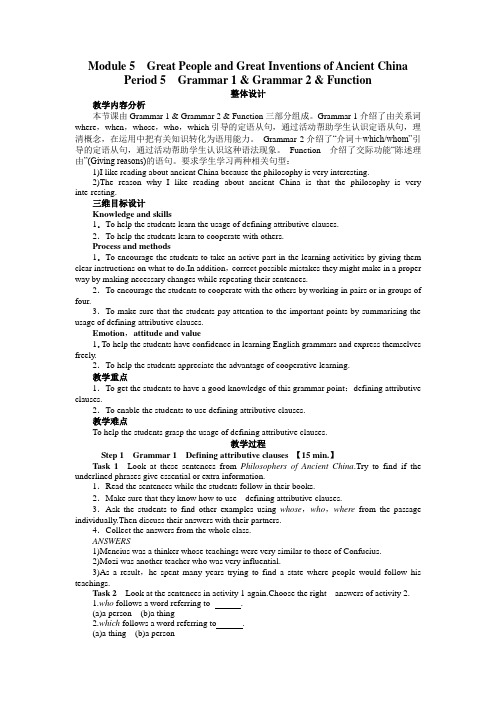
Module 5Great People and Great Inventions of Ancient China Period 5Grammar 1 & Grammar 2 & Function整体设计教学内容分析本节课由Grammar 1 & Grammar 2 & Function三部分组成。
Grammar 1介绍了由关系词where,when,whose,who,which引导的定语从句,通过活动帮助学生认识定语从句,理清概念,在运用中把有关知识转化为语用能力。
Grammar 2介绍了“介词+which/whom”引导的定语从句,通过活动帮助学生认识这种语法现象。
Function 介绍了交际功能“陈述理由”(Giving reasons)的语句。
要求学生学习两种相关句型:1)I like reading about ancient China because the philosophy is very interesting.2)The reason why I like reading about ancient China is that the philosophy is very inte-resting.三维目标设计Knowledge and skills1.To help the students learn the usage of defining attributive clauses.2.To help the students learn to cooperate with others.Process and methods1.To encourage the students to take an active part in the learning activities by giving them clear instructions on what to do.In addition,correct possible mistakes they might make in a proper way by making necessary changes while repeating their sentences.2.To encourage the students to cooperate with the others by working in pairs or in groups of four.3.To make sure that the students pay attention to the important points by summarising the usage of defining attributive clauses.Emotion,attitude and value1.To help the students have confidence in learning English grammars and express themselves freely.2.To help the students appreciate the advantage of cooperative learning.教学重点1.To get the students to have a good knowledge of this grammar point:defining attributive clauses.2.To enable the students to use defining attributive clauses.教学难点To help the students grasp the usage of defining attributive clauses.教学过程Grammar 1Defining attributive clauses 【15 min.】Task 1Look at these sentences from Philosophers of Ancient China.Try to find if theunderlined phrases give essential or extra information.1.Read the sentences while the students follow in their books.2.Make sure that they know how to use defining attributive clauses.3.Ask the students to find other examples using whose,who,where from the passage individually.Then discuss their answers with their partners.4.Collect the answers from the whole class.ANSWERS1)Mencius was a thinker whose teachings were very similar to those of Confucius.2)Mozi was another teacher who was very influential.3)As a result,he spent many years trying to find a state where people would follow his teachings.Task 2Look at the sentences in activity 1 again.Choose the right answers of activity 2.1.who follows a word referring to .(a)a person(b)a thing2.which follows a word referring to.(a)a thing(b)a person3.Instead of which you can say .(a)who (b)that4.where follows a word that refers to .(a)place (b)time5.when follows a word that refers to .(a)place (b)time6.whose means .(a)of whom (b)who1.Ask the students to complete this activity individually.Then they can discuss their answers with their partners.2.Collect the answers from the whole class.ANSWERS1.a2.a3.b4.a5.b6.awith their partners.2.Collect the answers from the whole class.ANSWERS1.E2.A3.B4.C5.Dwith their partners.2.Collect the answers from the whole class.ANSWERS1.which2.where3.when4.whose5.whose6.when7.whereGrammar 2 Defining attributive clauses :of whom ,in which 【18 min.】with their partners.2.Collect the answers from the whole class ,as complete sentences.ANSWERS1.C2.D3.B4.ATask 2 Underline the words that are different in each pair of sentences.1.Ask the students to complete this activity individually.Then they can discuss their answerswith their partners.2.Collect the answers from the whole class.ANSWERS1)identical2)identical3)was used/appeared in4)identicalTask 3Rewrite these sentences as in the examples in activity 1.1.The man who(m) I am thinking of invented the first real clock.2.These are the leaves which silk is made from.3.He is a person who(m) everyone has heard of.4.This is the house which the inventor lived in.1.Ask the students to complete this activity individually.Then they can discuss their answers with their partners.2.Collect the answers from the whole class.ANSWERS1.The man of whom I am thinking invented the first real clock.2.These are the leaves from which silk is made.3.He is a person of whom everyone has heard.4.This is the house in which the inventor lived.(These sentences are very formal;native speakers never say so.)with their partners.2.Collect the answers from the whole class.ANSWERS1.We're in the region in which printing was first invented.2.It's an invention of which he is very proud.3.He is a man of whom I am afraid because he has invented something very dangerous.4.The machine at which you are looking is very old.5.Is that the inventor to whom you were talking.1.where2.who3.whose4.whichFunction 【10 min.】Task 1Look at these sentences.Underline the words that are the same in both sentences.1.Read out the two examples while the students follow in their books.1)Mencius believed that the reason why man is different from animals is that man is good.2)Often,the reason why people are unhappy is that they do not have enough love.2.Ask the students to underline the common words individually.Then they can discuss their answers with their partners.3.Collect the answers from the whole class.ANSWERSthe reason/why/is/thatTask 2Rewrite the sentences.1.We remember the ancient philosophers because their ideas are important.2.I bought the book because it is about philosophy.3.Mencius resigned because the ruler was not following his advice.4.Mozi hated the idea of war because he thought people should not kill each other.1.Read out the four sentences while the students follow in their books.2.Ask the students to do the activity individually.Then they can discuss their answers with their partners.3.Collect the answers from the whole class.Show the answers on the screen or write them on the blackboard.ANSWERS1.The reason why we remember the ancient philosophers is that their ideas are important.2.The reason why I bought the book is that it is about philosophy.3.The reason why Mencius resigned was that the ruler was not following his advice.4.The reason why Mozi hated the idea of war was that he thought people should not kill each other.Making a summary 【2 min.】Summarise the whole period.First,emphasise the usage o f defining attributive clauses.Then sum up the features of the connectives:where,when,whose,who,which.HomeworkDo the exercise 1 and 2 on page 91.教学参考One Great Invention of Ancient China—Printing●Block PrintingWith the inventions of paper and ink,stamper gradually became popular during the Jin Dynasty(265-420),which was the early form of Carved Type Printing.Block Printing first appeared in the Tang Dynasty(618-907).The text was first written on a piece of thin paper,then glued face down onto a wooden plate.The characters were carved out to make a wood-block printing plate,which was used to print the text.Wood-block printing took a long time as a new block had to be carved for every page in a book.It took a lot of time and energy as well as materials to prepare for printing a book,but it worked more effectively afterwards.This technology was gradually introduced to Korea,Japan,Vietnam,and the Philippines.Yet,Block Printing had its drawbacks—all the boards became useless after the printing was done and a single mistake in carving could ruin the whole block.The frontispiece of the world's oldest surviving book,The Diamond Sutra printed in the year 868,was discovered at Dunhuang Cave,along the Silk Road.The book,in the form of a roll,is the earliest woodcut illustration in a printed book.●Movable Type PrintingBlock Printing was a costly and time-consuming process,for each carved block could only be used for a specific page of a particular book,besides,a single mistake in carving could ruin the whole block.However movable type printing changed all of that.In the Song Dynasty(960-1279),a man named Bi Sheng carved individual characters on identical pieces of fine clay.Each piece of movable type had on it one Chinese character which was carved in relief on a small block of moistened clay.After the block had been hardened by fire,the type became hard and durable and could be used wherever required.The pieces of movable type could be glued to an iron plate and easily detached from the plate.Each piece of character could be assembled to print a page and then broken up and redistributed as needed.When the printing was finished,the pieces were put away for future use.By the year 1000,paged books in the modern style had replaced scrolls.Two colour printing (black and red) was seen as early as 1340.This technology then spread to Korea,Japan,Vietnam and ter,German Johann Gutenberg invented movable type made of metal in the 1440s.Movable Type Printing developed very fast.Based on clay type,type made of wood,lead,tin and copper gradually appeared.。
高中英语外研版必修5【教学设计】Module 3
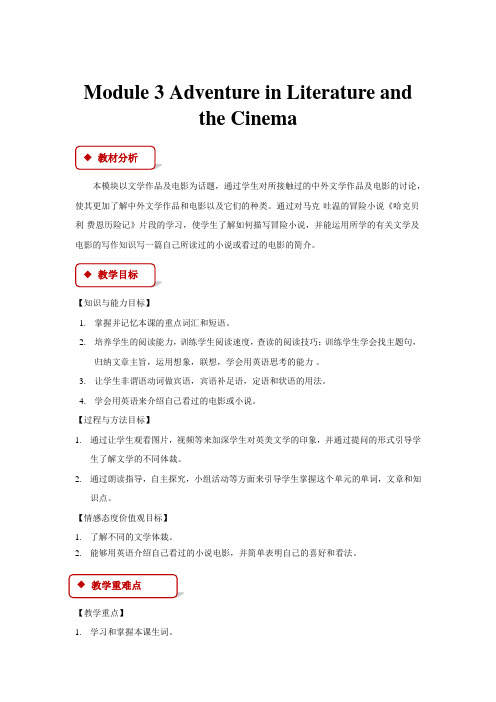
Module 3 Adventure in Literature andthe Cinema本模块以文学作品及电影为话题,通过学生对所接触过的中外文学作品及电影的讨论,使其更加了解中外文学作品和电影以及它们的种类。
通过对马克·吐温的冒险小说《哈克贝利·费恩历险记》片段的学习,使学生了解如何描写冒险小说,并能运用所学的有关文学及电影的写作知识写一篇自己所读过的小说或看过的电影的简介。
1.掌握并记忆本课的重点词汇和短语。
2.培养学生的阅读能力,训练学生阅读速度,查读的阅读技巧;训练学生学会找主题句,归纳文章主旨,运用想象,联想,学会用英语思考的能力。
3.让学生非谓语动词做宾语,宾语补足语,定语和状语的用法。
4.学会用英语来介绍自己看过的电影或小说。
【过程与方法目标】1.通过让学生观看图片,视频等来加深学生对英美文学的印象,并通过提问的形式引导学生了解文学的不同体裁。
2.通过朗读指导,自主探究,小组活动等方面来引导学生掌握这个单元的单词,文章和知识点。
【情感态度价值观目标】1.了解不同的文学体裁。
2.能够用英语介绍自己看过的小说电影,并简单表明自己的喜好和看法。
【教学重点】1.学习和掌握本课生词。
2.让学生掌握非谓语动词做宾语,宾语补足语,定语和状语的用法。
【教学难点】1.多层次的训练阅读能力,提高阅读水平2.怎样让学生灵活使用词汇、短语和句型来做题。
PPT、录音机等Step 1 Introduction1. Lead-inT: As I know, most of you have a good habit of reading books in your spare time. Who would like to tell me your favorite books? And why do you like them?S: My favorite book is The Dream of The Red Mansion. It introduces us not only a love story but also people’s life of Qing Dynasty. We can know more about Qing Dynasty by reading it. The book is also one of the most famous Chinese novels.S: I like reading Harry Potter and the Half-Blood Prince very much, which is written by J. K. Rowling. It is a book full of magic. At the same time, the book tells us justice can defeat vicious force no matter what happens. And Harry Potter is one of the most popular books all over the world.2. Warming upT: Very good! Then I have a question: How many different types of books do you know?Ss: Autobiography, crime...T: Please open your books and turn to page 21. Look at the words in the box which all describe the types of books. Please match them with their meanings.A few minutes later, check the answers.3. Pair-work: which book would you like to read and why? (Activity 1, P21)1). The teacher shows three short passages about the three books in activity 1Wolves of the Calla: The remote town, Calla, is best known for twins. Unfortunately, every ten years, some bad guys dressing up as wolves come to take away a child from each pair of the。
外研版高中英语必修三教案:Module 5阅读课(2)
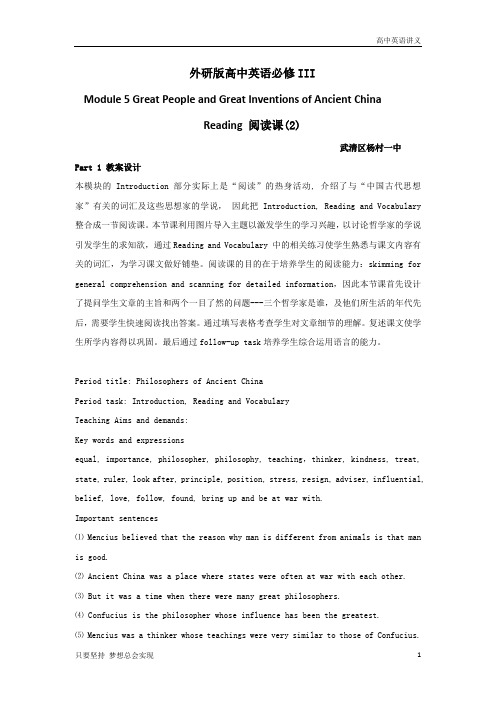
外研版高中英语必修IIIModule 5 Great People and Great Inventions of Ancient ChinaReading 阅读课(2)武清区杨村一中Part 1 教案设计本模块的Introduction 部分实际上是“阅读”的热身活动, 介绍了与“中国古代思想家”有关的词汇及这些思想家的学说,因此把Introduction, Reading and Vocabulary 整合成一节阅读课。
本节课利用图片导入主题以激发学生的学习兴趣,以讨论哲学家的学说引发学生的求知欲,通过Reading and Vocabulary 中的相关练习使学生熟悉与课文内容有关的词汇,为学习课文做好铺垫。
阅读课的目的在于培养学生的阅读能力:skimming for general comprehension and scanning for detailed information,因此本节课首先设计了提问学生文章的主旨和两个一目了然的问题---三个哲学家是谁,及他们所生活的年代先后,需要学生快速阅读找出答案。
通过填写表格考查学生对文章细节的理解。
复述课文使学生所学内容得以巩固。
最后通过follow-up task培养学生综合运用语言的能力。
Period title: Philosophers of Ancient ChinaPeriod task: Introduction, Reading and VocabularyTeaching Aims and demands:Key words and expressionsequal, importance, philosopher, philosophy, teaching,thinker, kindness, treat, state, ruler, look after, principle, position, stress, resign, adviser, influential, belief, love, follow, found, bring up and be at war with.Important sentences⑴ Mencius believed that the reason why man is different from animals is that man is good.⑵ Ancient China was a place where states were often at war with each other.⑶ But it was a time when there were many great philosophers.⑷ Confucius is the philosopher whose influence has been the greatest.⑸ Mencius was a thinker whose teachings were very similar to those of Confucius.3. Enable the students to learn about the information about the philosophers of ancient China and train their sense of culture and pride of nationality.4. Help the students to discuss the ways of agreements and disagreements and enable the students to get to know about different ways of showing opinions.5. Train the students’ skimming and scanning ability.Teaching important points and difficult pointsTalk about different ways of showing opinions and retell the text according to the chart.Teach the students how to skim.Teaching method: Fast reading, retelling and discussionTeaching procedures:Step1. Lead in and introductionShow pictures of the most famous great philosophers in ancient China--- Confucius, Mencius and Mozi, to arouse students’ interest.Confucius Mencius Mozi Show some teachings of them. Let students discuss the meanings, and then match the teachings with the names.Man is born good. A. ConfuciusAll human beings are equal.The family is important. We are members of a group. B. MenciusTreat others in the way you want to be treated.People are more important than rulers. C. MoziWe should love all human beings.Activity1: Check the meanings of these words: equal, importance, look after, philosopher, philosophy, ruler, state, teachings, thinker, treat, war.Ask students to use some of the words to complete the gaps of the passage on page 41 and then check the answers.Step 2 Reading and VocabularyActivity 1 on page 42: Read the words and match the words with definitions and then check the answers.Step 3 Fast reading/ skimming: Read the passage “Philosophers of ancient China” fast and answer the questions.Question1: What does the passage talk about?Tell the students: Look at the title, the picture and the first sentence of each paragraph, and predict the contents of the reading passage.Answer: Philosophers of Ancient ChinaQuestion2: Who are they? Answers: Confucius, Mencius and Mozi.Question3: Which shows the right order of time when these great thinkers lived? Confucius---Mencius---MoziMencius---Mozi---ConfuciusConfucius---Mozi---MenciusMozi---Mencius---ConfuciusAnswer: CActivity 2 on Page 42: Read the text quickly and find proper words and phrases in the passage to match these definitions.Step 4 Detailed reading (Scanning)Activity3 on Page 42: Read the passage again and choose the correct answers. Then fill in the table according to the text about the three great philosophersAnswers:Step 5 Language points:Phrases: 1. be at war with 与…处于交战状态2. stress the importance of 强调… 的重要性3. be influenced by 受…的影响4. be similar to 与…相似5. bring up 抚养6. follow one’s advice 听从某人的建议7. travel from state to state 周游列国8. an adviser to a ruler 统治者的军师9. become famous for 以…而闻名10. believe in 信任11. in some ways 在某些方面; 某种程度上12. as a result 因此; 结果13. look after 照料Patterns: 1. It was also a time when…2. Mencius believed that the reason why man is different from animals is that man is good.Step 6 Ask the students to retell the text according to the chart above.Ask one or two good students to retell the text. This part can be assigned as homework.Step 7 Post reading (Follow-up activity: This step is important to train students’ integrated ability)Group discussion:Whose statements do you agree to or disagree to? Why?Using the patterns:Agreements:That’s exactly my opinion.You’re quite right.I quite agree with you.I very much agree with the statement.In my opin ion,…Disagreements:I don’t think you’re right.I’m afraid I don’t agree with you.I’m afraid I disagree with you.I’m afraid not.Step 8 AssignmentFind out the sentences that have attributive clauses. Remember the phrases, key sentences and the expressions about agreement and disagreement.Retell the text.Part 2 教学反思本节课的教学进展顺利,利用图片导入引发了学生的学习兴趣,第一个阅读任务设计简单,学生快速阅读找出答案,使学生树立了自信心,为后面更难的阅读任务奠定了良好的基础。
外研社必修三Module5教案电子教案.docx

外研社必修三Mod ul e5 教案科目Teaching ContentTeaching Objectives学习—————好资料Teaching Plan英语年级高一教师许宝玉Book 3 : Module 5 Great People and Great Inventions of Ancient China( Reading and Vocabulary)1. Knowledge aims:(1)To help students understand the words and some useful expressions(2)To get the students have a better understanding of the text( 3)To train the students’ ability of guess words’ meaning by read the sentence (4)Learn to introduce a great person from some aspects---names and thoughts2. Language ability aims:Theoretical basis: High school English curriculum standards emphasize the ability toacquire and process information in English1). Can get the main information from the article and extract the main points2). Can understand the subject of the article, the author's intention3). Can extract, filter and reorganize the information in the article4). Can use the context to guess new words(1)Learn to read with some reading strategies(2) Improve students ’ integrated abilitiesspeakingof and reading(3)Learn to introduce a great philosopher.3.Learning strategy aims:Vocabulary classificationEffective self-regulation during reading, English interaction, and task completion. Obtain relevant information through various channels, identify and apply effective resources.4.Cultural awareness and emotional attitude:To get the students learn more about the great people and great inventions of ancientChina 5. Teaching important points1.Know the pronunciations of new words. For the students, know the pronunciations of the words are really important. Only if they know them clearly, can they understand the words exactly.2. Talk about the great people and great inventions of ancient China. Get the general information about the great people, such as Confucius, Mozi and Mencius.学习—————好资料Teaching Material and Students Analysis 6. Teaching Difficult Points1.How to describe a great person. Description is difficult for the students; the teacher shouldguide them to introduce the person from some aspects. For example, the teacher can ask the students to describe the person from these aspects: names, birthplace,and thoughts.2.Let the students understand the passage better and let them grasp key words and phrases.The content of my lesson is Module 5 in New Standard English Book 3. This module is aboutthe Great People and Great Inventions of Ancient China. It introduces three famous people inChina. They are Confucius, Mozi and Mencius. By studying of this unit, we ’ ll enable students to know more about the great people and great inventions in ancient China. At the same time,let the students learn how to describe a person. Students in grade one in senior high school. /Average class/ They haven ’ t completely changed their smethodofstudying and cannotinvolve themselves in the class activities fully. They have difficulty in expressing themselvesin English clearly. Some students are not very interested in English.Teaching Aid Teaching ProcedureLead –in Pre-reading Blackboard; A recorder; Computer; A projectorThe teacher’ s activityShow Ss some pictures of great people in China and in theworld and ask them who is your most admired or respectedgreat people of China ?Task 1:Complete the gaps with the words in the box onpage41.Then ask individuals to show their answers.equal philosopher thinker treat state rulerphilosophy teachings war look afterTask 2:Q1: Do you know any philosopher of ancient China?Guess the people by what they said.Q2: Look at the pictures and answer thefollowingquestions.The students’purposeactivityStudents need to havLead ina brain-storm and 3minsspeakloudly.The students8minsdivide Strengthenthemselves into basisgroups andwork togetherand give out theanswers.Ss can have avivid and afurtherunderstanding学习—————好资料Who is he? What was his main idea?of the personPre-and keep their learninginterest inlearning.Task 3:While –reading Read these statements and tick the ideas that Confuciustaught.Skimming:Task 1:Ss should read the material fast to find the words andphrases in the passage that match these definitions. Task 2:Ask students to read the passage as quickly as they can,then read questions on the screen and choose the correctanswers.Students readthe sentencesand make achoice.The studentsread the 25minspassagecarefully andgive out theanswers.Scanning:Task 1. (Individual work)Ask Ss to read the three parts carefully and fill in theblanks. And teacher will check the answers.DeeperlearningThe studentsfinish the taskcarefully anddiscuss witheach other, andthen share theideas.学习—————好资料Task 2. (Individual work )Ask Ss to read the the passage again and decide if these following sentences are true or false.1.Confucius lived in a country where there was no wara long time ago.2.Confucius was a philosopher whose influence has been the greatest for more than 2000 years.3.Mencius was a student taught by Confucius.4.Some rulers followed the advice which was given by Mencius.5.Mozi was a man who lived an unusual life.Task 3. ( Group work)Ask Ss to read the the sentences carefully and try to translate them into Chinese. They can finish it in the form of group.Summary The studentsread the Improve passage and the Reading questions again Skillsandfinish the taskon their own.consolidationTask 1: Discussion these questions.Which of the following opinions do you think is the mostimportant? And why?(1)All men are equal.Post- reading(2)Kindness and love.(3)Peace.Task 2:Peace is quite important. Peace and development are thetwo subjects of our modern world. In history, wars haveLinkingtheknowledge Students need learned withreal life and to organize infiltrating their language the concept of and words andmoraleducation to give a brief help students answer.establish acorrectoutlook onlife, enhancesocialresponsibility,学习—————好资料caused great damage to people. Many people lost their lives,many people became homeless, and people led a hard andpoor life. People all over the world wants a peacefulenvironment.Anybody can help others with a willing heart. Let’ s try our best to lend others a helping hand and work hand inhand to create a harmonious society.and comprehensiv ely improve humanistic quality.8minsWrite a passage about a person you admire most or you well know and introduce he or she from some aspects in Homeworkthe writing paper. Hand in before next class.Assignment Students need Deepento get enough students' information overall about the the impression of person and the text finish acompositionbased on that.2mins。
外研版Book 3Module5教学设计
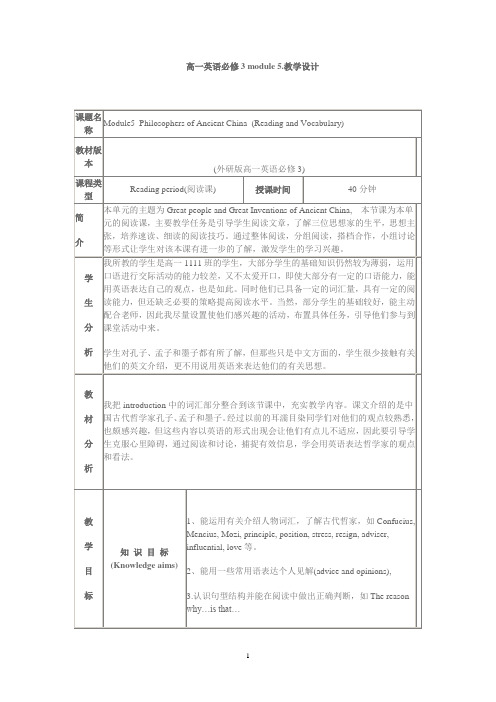
C. The author wants to tell interesting stories about three important teachers in ancient China.
3.认识句型结构并能在阅读中做出正确判断,如The reason why…is that…
能力目标
(Ability aims)
1、培养速读、细读的阅读技巧;
2、把握文章思想主旨,学习古代伟大思想家的伟大思想,使学生把古代的哲学思想与现代社会生活联系起来,提高学生认识问题,判断问题和用英语表达自己意见的能力;
3、通过问答、讨论,培养了学生自主、合作和探究的精神,培养学生在英语环境中用英语思维,用英语表达的良好习惯。
情感目标
(Emotional aims)
增强文化意识和民族自豪感,培养学生善良博爱的高尚品质。
教学重点难点
1、学会认读课文有关词汇。
2、培养学生的阅读策略,使其形成根据文章标题或首段内容猜测文章内容以及根据关键词获取信息的能力。
高一英语必修3 module 5.教学设计
课题名称
Module5 Philosophers of Ancient China (Reading and Vocabulary)
教材版本
(外研版高一英语必修3)
课程类型
Readingperiod(阅读课)
授课时间
40分钟
简
介பைடு நூலகம்
本单元的主题为Great people and Great Inventions of Ancient China,本节课为本单元的阅读课,主要教学任务是引导学生阅读文章,了解三位思想家的生平,思想主张,培养速读、细读的阅读技巧。通过整体阅读,分组阅读,搭档合作,小组讨论等形式让学生对该本课有进一步的了解,激发学生的学习兴趣。
外研社必修三Module5教案电子教案
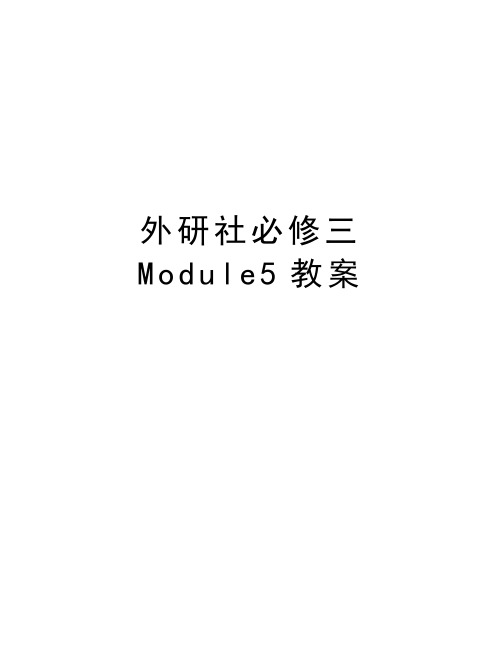
外研社必修三M o d u l e5教案Teaching PlanWho is he? What was his main idea?Task 3:Read these statements and tick the ideas that Confucius taught.of the personand keep theirinterest in learning.Students readthe sentencesand make achoice.Pre-learningWhile–reading Skimming:Task 1:Ss should read the material fast to find the words andphrases in the passage that match these definitions.Task 2:Ask students to read the passage as quickly as they can,then read questions on the screen and choose the correctanswers.Scanning:Task 1. (Individual work)Ask Ss to read the three parts carefully and fill in theblanks. And teacher will check the answers.The studentsread thepassagecarefully andgive out theanswers.The studentsfinish the taskcarefully anddiscuss witheach other, andthen share theideas.25minsDeeperlearningTask 2. (Individual work )Ask Ss to read the the passage again and decide if these following sentences are true or false.1. Confucius lived in a country where there was no war a long time ago.2.Confucius was a philosopher whose influence has been the greatest for more than 2000 years.3. Mencius was a student taught by Confucius.4.Some rulers followed the advice which was given by Mencius.5. Mozi was a man who lived an unusual life. Task 3. ( Group work)Ask Ss to read the the sentences carefully and try to translate them into Chinese. They can finish it in the form of group. SummaryThe students read thepassage and thequestions again and finish the taskon their own.Improve Reading SkillsconsolidationPost- readingTask 1: Discussion these questions. Which of the following opinions do you think is the mostimportant? And why? (1)All men are equal. (2)Kindness and love. (3)Peace. Task 2:Peace is quite important. Peace and development are the two subjects of our modern world. In history, wars haveStudents needto organize their language and words and give a brief answer.Linking theknowledge learned with real life and infiltrating the concept of moraleducation to help students establish a correct outlook on life, enhance socialresponsibility,。
外研版高中英语必修3 Module5 Period 5参考教案

Module5 Period5参考教案Grammar2; Writing; Everyday EnglishTeaching aims:1)Learn the attributive clauses with prepositions.2)Make students understand how to write argumentation.3)Know everyday English and how to use them.Teaching importances:1.The usage of “preposition + relative pronoun”.2.How to write argumentation.3.To use Everyday English when communicating.Teaching difficulties:1.The choice of the prepositions in the attributive clauses.2.Help students to master writing skills.3.Make sure students use Everyday English correctly.Teaching methods:1.Expanation and practice.2.Individual or pair work.3.Make students know more about the grammar through pair work.Teaching aids:Blackboard notebook multimediaTeaching steps:Step1 Greetings and RevisionCheck their homework.Have a dictation of the words learnt last class.Words for dictation: justice, honesty, respect, duty, importance, contribution, argument, stress, invent, leather.Step2 Grammar2In Grammar1, we have known what the attributive clause is, and its basic usage. We know the relative pronouns are used as objects either after verbs or after prepositions. The position of the preposition must be paid more attention to. If thepreposition is used before the relative pronoun,Step3 WritingArgumentation is an essay which tells readers your own opinions about one topic.It usually is divided into three parts.The first part is introduction, which gives some general facts about the subject.The second part is illustration. This part will illustrate your ideas in detail.The third part is conclusion, which gives the writer’s final opinion.Step4 Everyday EnglishWe all know language is for communication.So everyday English is what we often use in our daily life.So it is important for us to master it.Let’s look at the phrases in the box.You can discuss with your partner, and then fill up the dialogue.Step5 Summary and HomeworkIn this period, first, we continued to learn attributive clauses introduced by “preposition + which/whom”. We also did some exercises to consolidate the,. Second, we learned how to write argumentation, which is a very important writing style. Finally, we mastered some Everyday English.Homework:Do the extra exercises about the attributive clause.板书设计Module5 Great People and Great Inventions of Ancient ChinaPeriod5 Writing; Everyday EnglishThe attributive clause(1)prep.+whom/which(2)when(time)=at/in/on/during whichwhere(place)=at/in/on whichwhy(reason)=for which。
外研版高一英语教案:必修3 unit 5教案
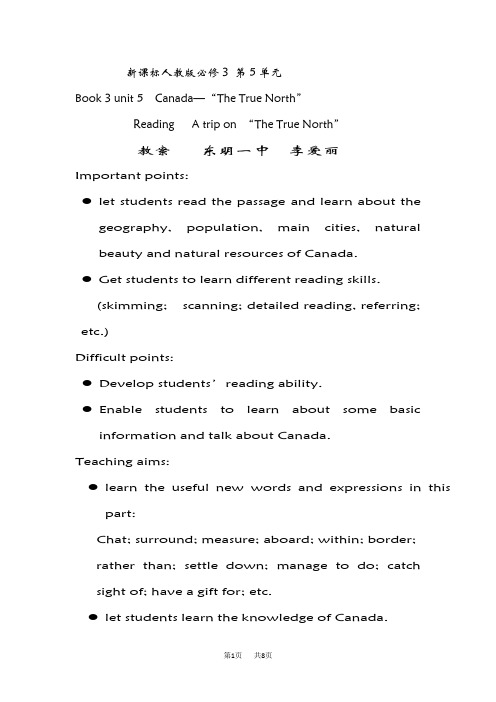
新课标人教版必修3 第5单元Book 3 unit 5 Canada—“The True North”Reading A trip on “The True North”教案东明一中李爱丽Important points:●let students read the passage and learn about thegeography, population, main cities, naturalbeauty and natural resources of Canada.●Get students to learn different reading skills.(skimming; scanning; detailed reading, referring; etc.)Difficult points:●Develop students’reading ability.●Enable students to learn about some basicinformation and talk about Canada.Teaching aims:●learn the useful new words and expressions in thispart:Chat; surround; measure; aboard; within; border;rather than; settle down; manage to do; catchsight of; have a gift for; etc.●let students learn the knowledge of Canada.●Develop students’reading ability and learndifferent reading skills.●let students learn how to read a travelling reportand how to use a map●Stimulate interests in learning about foreigncountries.Teaching methods: skimming, scanning, discussing,etc.Teaching aids: multimedia and a computer.Teaching proceduresThe first period Reading (I)Step 1 Leading-in1.Show a list of pictures to students, ask them enjoythe beautiful scenery and try to guess where the scenery comes from.2.Have a quiz (How much do you know aboutCanada?) Divide the whole class into 2 groups (boys and girls). Let students have a competition.( Aims: to introduce the unit topic and arouse students’interests in class activities)Show the following on the screen1.Which is the national flag of Canada?A . B. C. D. ( 4 pictures on the screen)2. Which is the national flower of Canada?A. cherryB. roseC. mapleD. daffodil (with pictures on the screen)3. What language(s) do Canadians speak?A. EnglishB. English and GermanC. English and FrenchD. English and Spanish (with pictures on the screen)4. What is the capital of Canada?A. VancouverB. TorontoC. CalgaryD. Ottawa(with pictures on the screen)5. What is the national animal of Canada?A.BeaverB. Grizzly bearC. Polar bearD. Penguin(with pictures on the screen)6. What is the leader of the country called?A.PresidentB. Prime MinisterC. QueenD. Chairman7. which lake is not in Canada?ke SuperiorB. Lake HuronC. Lake ErieD. Lake OntarioE. Lake Michigan (Show a map on thescreen)Step 2 ReadingI. Skimming(略读) 2ms Ask students: Do you feel puzzled when reading the title? To find the answer quickly you’d better have a skimming of the passage.( develop students’reading ability to get the main idea and certain information.)Reading tips:Go through the passage quickly and silently to get the main idea. Don’t worry about the details and new words.Skim the passage and then answer the following questions:1)What is the passage mainly about?It is about ______ of two girls; and it tells us some information about ______.2) What is “The True North”?The True North is a name of ___________.II. Scanning (跳读) 4ms ( Aims: Develop students’ability to get specific information for the passages and make preparations for the next task.)Reading tips:It is a travelling journal (游记) so we should find out the essential items (基本项目) in it.Scan the passage and find out characters(人物), places and their travelling route(路线).Characters:Places :Route:Draw a travelling route on the map on P33 III. Detailed reading( 细读) 10ms (Aims: Develop students’ability to get more details about the passage, and have students get a further understanding including some words and sentences) Read the passage more carefully and find more information about Canada. Then finish the following tasks .Task 1 A trip on “The True North”Task 2 Do you know what they refer to(指代)?They could cross the whole continent…( para 1)•Its population is increasing rapidly.(para 2)and much of it is in the Great Lakes.( para 4)•Task 3 Translation Bar ( 译译吧)⏹That afternoon, the cousins got on the trainand then sat in their comfortable seats⏹Some people have the idea that you cancross Canada in less than five days, butthey forget the fact that Canada is 5,500kilometres from coast to coast.⏹她们不想一路乘飞机,而决定先飞温哥华,再从西海岸乘火车横穿加拿大到达东海岸。
外研版高中英语必修3 Module5 Period 1参考教案
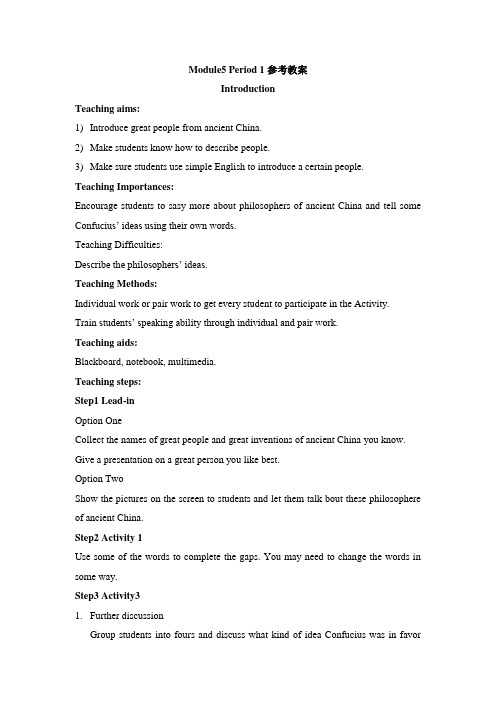
Module5 Period 1参考教案IntroductionTeaching aims:1)Introduce great people from ancient China.2)Make students know how to describe people.3)Make sure students use simple English to introduce a certain people.Teaching Importances:Encourage students to sasy more about philosophers of ancient China and tell some Confucius’ ideas using their own words.Teaching Difficulties:Describe the philosophers’ ideas.Teaching Methods:Individual work or pair work to get every student to participate in the Activity.Train students’ speaking ability through individual and pair work.Teaching aids:Blackboard, notebook, multimedia.Teaching steps:Step1 Lead-inOption OneCollect the names of great people and great inventions of ancient China you know. Give a presentation on a great person you like best.Option TwoShow the pictures on the screen to students and let them talk bout these philosophere of ancient China.Step2 Activity 1Use some of the words to complete the gaps. You may need to change the words in some way.Step3 Activity31.Further discussionGroup students into fours and discuss what kind of idea Confucius was in favorof.. Let them discuss a few minutes2.Write one or two sentences and explain why.We all know Confucius had many ideas. And many students have given us some of them.Do you agree with which idea of Confucius and tell us why.Step4 Summary and HomeworkIn this class you have known some great people of ancient China and their great inventions and it may help you to study history. You have also learned many new words which are related to philosophy. After class, I can master these words and find more information about great people of ancient China.Homwork:1.Collect more information about ancient Chinese philosophy.2.Say three things you know about Confucius.3.Say what you know about Mencius and Mozi.板书设计Module5 Great People and Great Inventions of Ancient ChinaPeriod 1 IntroductionWords:Equal importance look after philosopher rulerState teachings thinker treat war。
外研版高中英语必修3 Module5学案
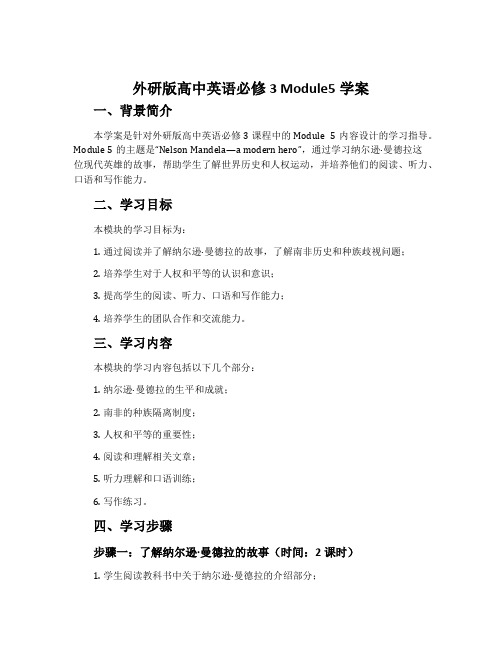
外研版高中英语必修3 Module5学案一、背景简介本学案是针对外研版高中英语必修3课程中的Module 5内容设计的学习指导。
Module 5的主题是“Nelson Mandela—a modern hero”,通过学习纳尔逊·曼德拉这位现代英雄的故事,帮助学生了解世界历史和人权运动,并培养他们的阅读、听力、口语和写作能力。
二、学习目标本模块的学习目标为:1.通过阅读并了解纳尔逊·曼德拉的故事,了解南非历史和种族歧视问题;2.培养学生对于人权和平等的认识和意识;3.提高学生的阅读、听力、口语和写作能力;4.培养学生的团队合作和交流能力。
三、学习内容本模块的学习内容包括以下几个部分:1.纳尔逊·曼德拉的生平和成就;2.南非的种族隔离制度;3.人权和平等的重要性;4.阅读和理解相关文章;5.听力理解和口语训练;6.写作练习。
四、学习步骤步骤一:了解纳尔逊·曼德拉的故事(时间:2课时)1.学生阅读教科书中关于纳尔逊·曼德拉的介绍部分;2.学生讨论纳尔逊·曼德拉的生平和成就;3.学生写一篇短文,介绍纳尔逊·曼德拉及其对世界的影响。
步骤二:了解南非的种族隔离制度(时间:2课时)1.学生观看相关视频,了解南非的种族隔离制度;2.学生阅读教科书中关于南非种族歧视的部分;3.学生小组讨论南非的种族隔离制度对社会造成的影响;4.学生写一篇短文,分析种族隔离制度对南非社会的影响。
步骤三:探讨人权和平等的重要性(时间:1课时)1.学生通过小组讨论,了解人权和平等的重要性;2.学生阅读相关文章,扩展对人权和平等的认识;3.学生写一篇短文,论述人权和平等的重要性。
步骤四:阅读理解和讨论(时间:2课时)1.学生阅读教科书中的相关文章,并回答相关问题;2.学生扩展阅读相关文章,了解更多关于纳尔逊·曼德拉和南非的内容;3.学生小组讨论所读文章的主题和观点。
外研版必修3 Module5教案
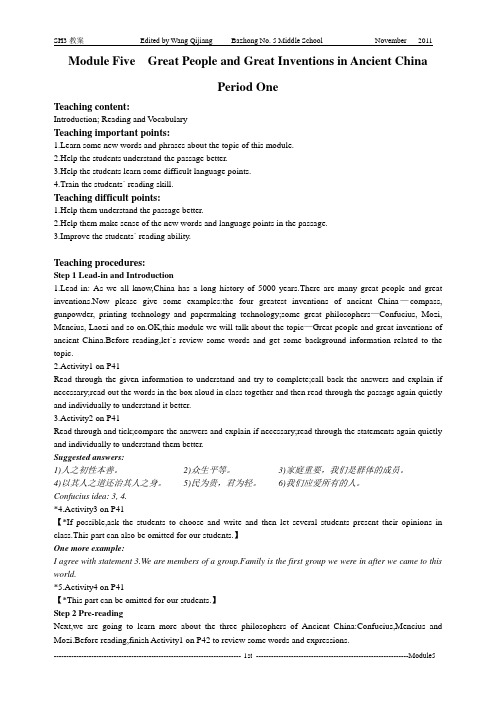
Module Five Great People and Great Inventions in Ancient ChinaPeriod OneTeaching content:Introduction; Reading and V ocabularyTeaching important points:1.Learn some new words and phrases about the topic of this module.2.Help the students understand the passage better.3.Help the students learn some difficult language points.4.Train the students` reading skill.Teaching difficult points:1.Help them understand the passage better.2.Help them make sense of the new words and language points in the passage.3.Improve the students` reading ability.Teaching procedures:Step 1 Lead-in and Introduction1.Lead-in: As we all know,China has a long history of 5000 years.There are many great people and great inventions.Now please give some examples:the four greatest inventions of ancient China—compass, gunpowder, printing technology and papermaking technology;some great philosophers—Confucius, Mozi, Mencius, Laozi and so on.OK,this module we will talk about the topic—Great people and great inventions of ancient China.Before reading,let`s review some words and get some background information related to the topic.2.Activity1 on P41Read through the given information to understand and try to complete;call back the answers and explain if necessary;read out the words in the box aloud in class together and then read through the passage again quietly and individually to understand it better.3.Activity2 on P41Read through and tick;compare the answers and explain if necessary;read through the statements again quietly and individually to understand them better.Suggested answers:1)人之初性本善。
最新-高一英语 模块5 教案 外研版必修3 精品
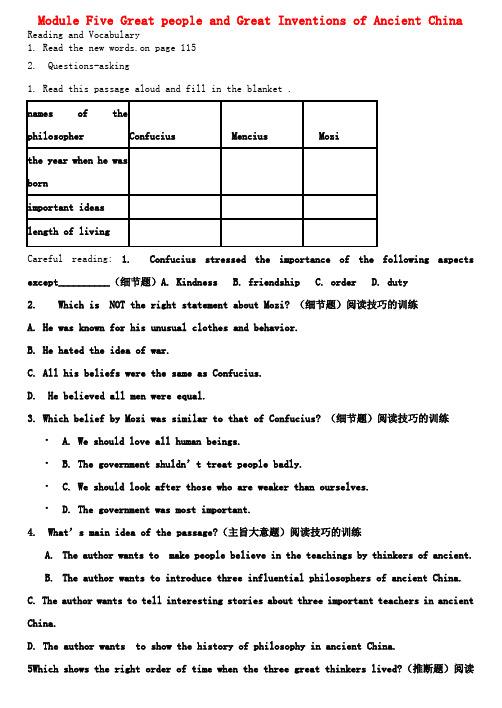
Module Five Great people and Great Inventions of Ancient China Reading and Vocabulary1. Read the new words.on page 1152. Questions-asking1. Read this passage aloud and fill in the blanket .Careful reading: 1. Confucius stressed the importance of the following aspects except__________(细节题)A. Kindness B. friendship C. order D. duty2. Which is NOT the right statement about Mozi? (细节题)阅读技巧的训练A. He was known for his unusual clothes and behavior.B. He hated the idea of war.C. All his beliefs were the same as Confucius.D. He believed all men were equal.3. Which belief by Mozi was similar to that of Confucius? (细节题)阅读技巧的训练• A. We should love all human beings.• B. The government shuldn’t treat people badly.• C. We should look after those who are weaker than ourselves.• D. The government was most important.4. What’s main idea of the passage?(主旨大意题)阅读技巧的训练A.The author wants to make people believe in the teachings by thinkers of ancient.B.The author wants to introduce three influential philosophers of ancient China.C. The author wants to tell interesting stories about three important teachers in ancient China.D. The author wants to show the history of philosophy in ancient China.5Which shows the right order of time when the three great thinkers lived?(推断题)阅读技巧的训练A. Confucius--- Mencius ---MoziB. Mencius----Mozi----ConfuciusC. Confucius---Mozi---MenciusD. Mozi--- Mencius---Confucius6From the text we can infer that__________(_推断题)阅读技巧的训练A. Only in time of war could philosophers produce great teaching.B. It was not easy to find a state where people would follow the thinker's teaching.C. Great philosophers must have been born in poor families.D. Influential philosophers wouldn’t agree with each other.Step 4 Consolidation:His father died when…,and he was …He became a student of… and was then given….However ,when he saw that…he resigned.For many year s,he travelled from state to state,teaching… .He then became…He spent his last year…he believed…Mozi was another teacher ______ was very _____________._____in 476 BC,he came from a family _____was very poor.He became famous ______ his unusual clothes and ___________.Mozi ___________ the philosophy called Mohism._______ some ways,his _________ were ____________ those of Confucius.For example,he considered that government was most important.As a result,he spent many years _______ to find a state _________ people would follow his _________.拓展:1.Man is born good.2.All human beings are equal.3.The family is improtant. We are members of a group.4.Treat others in the way you want to be treated.5.People are more important than rulers.6.We should love all human beings.。
外研社必修三Module5教案
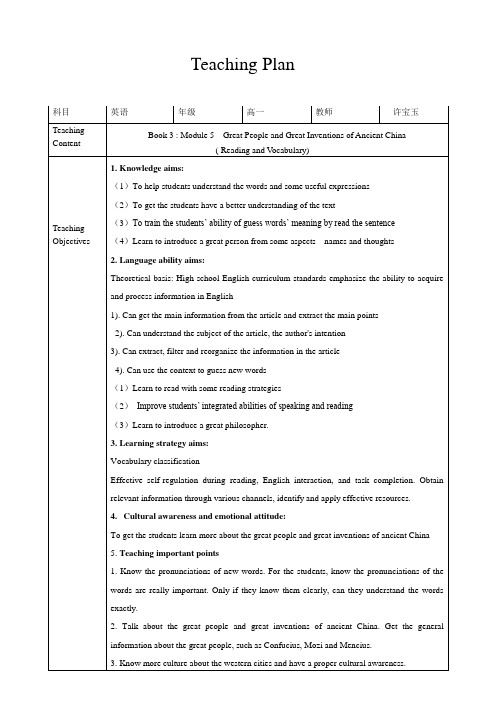
Teaching Material and Students Analysis
The content of my lesson is Module 5 in New Standard English Book 3. This module is about the Great People and Great Inventions of Ancient China. It introduces three famous people in China. They are Confucius, Mozi and Mencius. By studying of this unit, we’ll enable students to know more about the great people and great inventions in ancient China. At the same time, let the students learn how to describe a person. Students in grade one in senior high school. / Average class/ They haven’t completely changed their methods of studying and cannot involve themselves in the class activities fully. They have difficulty in expressing themselves in English clearly. Some students are not very interested in English.
Teaching Aid Blackboard; A recorder; Computer; A projector
外研社版高一必修三第五模块教学设计.doc
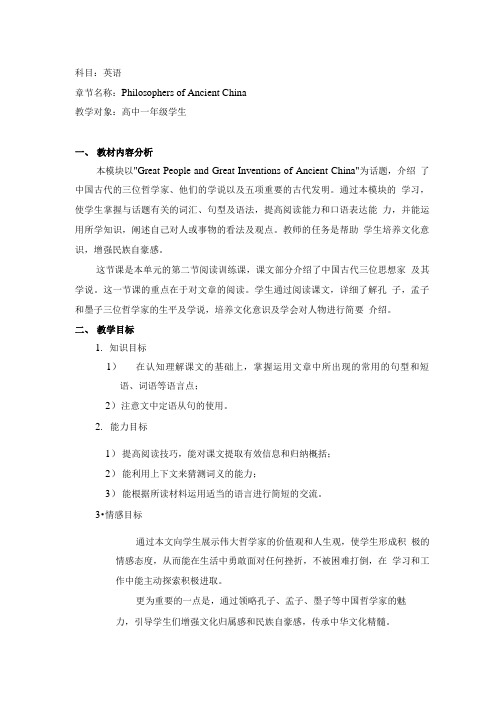
科目:英语章节名称:Philosophers of Ancient China教学对象:高中一年级学生一、教材内容分析本模块以"Great People and Great Inventions of Ancient China"为话题,介绍了中国古代的三位哲学家、他们的学说以及五项重要的古代发明。
通过本模块的学习,使学生掌握与话题有关的词汇、句型及语法,提高阅读能力和口语表达能力,并能运用所学知识,阐述自己对人或事物的看法及观点。
教师的任务是帮助学生培养文化意识,增强民族自豪感。
这节课是本单元的第二节阅读训练课,课文部分介绍了中国古代三位思想家及其学说。
这一节课的重点在于对文章的阅读。
学生通过阅读课文,详细了解孔子,孟子和墨子三位哲学家的生平及学说,培养文化意识及学会对人物进行简要介绍。
二、教学目标1.知识目标1)在认知理解课文的基础上,掌握运用文章中所出现的常用的句型和短语、词语等语言点;2)注意文中定语从句的使用。
2.能力目标1)提高阅读技巧,能对课文提取有效信息和归纳概括;2)能利用上下文来猜测词义的能力;3)能根据所读材料运用适当的语言进行简短的交流。
3•情感目标通过本文向学生展示伟大哲学家的价值观和人生观,使学生形成积极的情感态度,从而能在生活中勇敢面对任何挫折,不被困难打倒,在学习和工作中能主动探索积极进取。
更为重要的一点是,通过领略孔子、孟子、墨子等中国哲学家的魅力,引导学生们增强文化归属感和民族自豪感,传承中华文化精髓。
%1.学情分析高一学生经过半年多的学习,在知识和能力方面的有所提高,所以英语教学要侧重于学生的综合语言运用能力,尤其要优化学生的学习方式,要引导学生在阅读的过程中学会分析和欣赏。
同时,在教学中要使学生通过观察、体验、探究等主动的学习方法,充分发挥自己的学习潜能,形成有效的学习策略,提高自主学习能力。
教学重难点1.教学重点1)了解三位哲学家的价值观和世界观;2)训练skimming, scanning, careful reading 等阅读技能;3)对文章深层次的理解及细节的欣赏及对人物的评价。
高一英语 Module Five 整体教案 外研版必修3
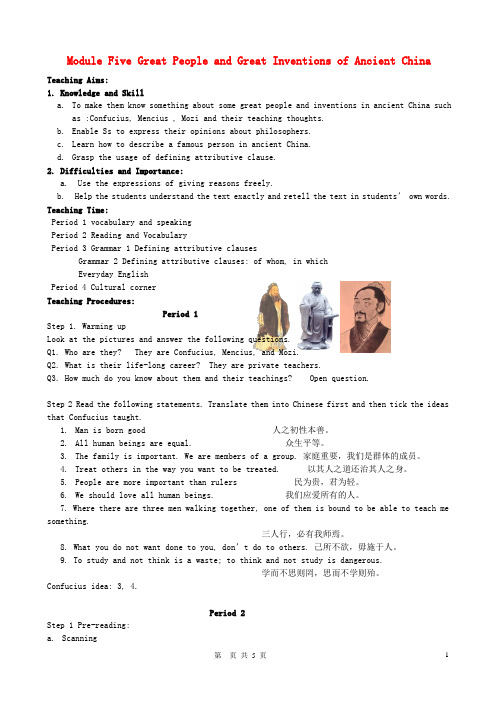
Module Five Great People and Great Inventions of Ancient ChinaTeaching Aims:1. Knowledge and Skilla.To make them know something about some great people and inventions in ancient China suchas :Confucius, Mencius , Mozi and their teaching thoughts.b.Enable Ss to express their opinions about philosophers.c.Learn how to describe a famous person in ancient China.d.Grasp the usage of defining attributive clause.2. Difficulties and Importance:a. Use the expressions of giving reasons freely.b. Help the students understand the text exactly and retell the text in students’ own words. Teaching Time:Period 1 vocabulary and speakingPeriod 2 Reading and VocabularyPeriod 3 Grammar 1 Defining attributive clausesGrammar 2 Defining attributive clauses: of whom, in whichEveryday EnglishPeriod 4 Cultural cornerTeaching Procedures:Period 1Step 1. Warming upLook at the pictures and answer the following questions.Q1. Who are they? They are Confucius, Mencius, and Mozi.Q2. What is their life-long career? They are private teachers.Q3. How much do you know about them and their teachings? Open question.Step 2 Read the following statements. Translate them into Chinese first and then tick the ideas that Confucius taught.1.Man is born good 人之初性本善。
- 1、下载文档前请自行甄别文档内容的完整性,平台不提供额外的编辑、内容补充、找答案等附加服务。
- 2、"仅部分预览"的文档,不可在线预览部分如存在完整性等问题,可反馈申请退款(可完整预览的文档不适用该条件!)。
- 3、如文档侵犯您的权益,请联系客服反馈,我们会尽快为您处理(人工客服工作时间:9:00-18:30)。
His father died when...,and he was ...He became a student of... and was then given....However ,when he saw that...he resigned.For many years,he travelled from state to state,teaching... .He then became...He spent his last year...he believed...
D. He believed all men were equal.
3. Which belief by Mozi was similar to that of Confucius? (细节题)阅读技巧的训练
? A. We should love all human beings.
? B. The government shuldn't treat people badly.
B. It was not easy to find a state where people would follow the thinker's teaching.
C. Great philosophers must have been born in poor families.
D. Influential philosophers wouldn't agree with each other.
Module Five Great people and Great Inventions of Ancient China
Reading and Vocabulary
1. Read the new words.on page 115
2. Questions-asking
1. Read this passage aloud and fill in the blanket .
5Which shows the right order of time when the three great thinkers lived?(推断题)阅读技巧的训练
A. Confucius--- Mencius ---Mozi
B. Mencius----Mozi----Confucius
? C. We should look after those who are weaker than ourselves.
? D. The government was most important.
4. What's main idea of the passage?(主旨大意题)阅读技巧的训练
拓展:
1. Man is born good.
2. All human beings are equal.
3. The family is improtant. We are members of a group.
4. Treat others in the way you want to be treated.
C. Confucius---Mozi---Mencius
D. Mozi--- Mencius---Confucius
6From the text we can infer that__________(_推断题)阅读技巧的训练
A. Only in time of war could philosophers produce great teaching.
2. Whiut Mozi? (细节题)阅读技巧的训练
A. He was known for his unusual clothes and behavior.
B. He hated the idea of war.
C. All his beliefs were the same as Confucius.
names of the philosopher
Confucius
Mencius
Mozi the year when he was born important ideas length of living Careful reading: 1. Confucius stressed the importance of the following aspects except__________(细节题)A. Kindness B. friendship C. order D. duty
Mozi was another teacher ______ was very _____________._____in 476 BC,he came from a family _____was very poor.He became famous ______ his unusual clothes and ___________.Mozi ___________ the philosophy called Mohism._______ some ways,his _________ were ____________ those of Confucius.For example,he considered that government was most important.As a result,he spent many years _______ to find a state _________ people would follow his _________.
A. The author wants to make people believe in the teachings by thinkers of ancient.
B. The author wants to introduce three influential philosophers of ancient China.
5. People are more important than rulers.
6. We should love all human beings.
1
C. The author wants to tell interesting stories about three important teachers in ancient China.
D. The author wants to show the history of philosophy in ancient China.
